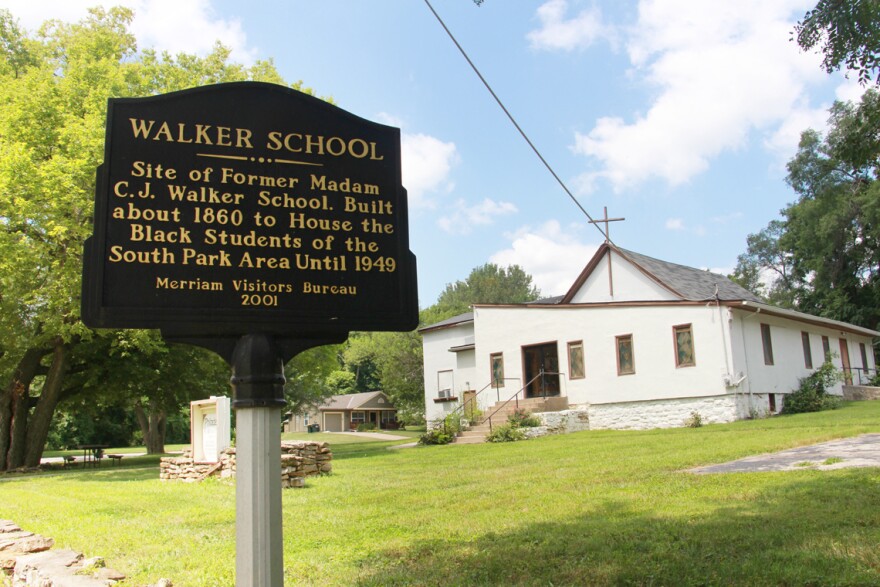A Johnson County school propelled one of the Black community’s first fights for equal education in Kansas, and faculty and students at MidAmerica Nazarene University are now working to preserve that important history.
The Madam C.J. Walker School in Merriam was a Black school at the center of a lawsuit that ended school segregation in that community. Just five years after the 1949 ruling, the U.S. Supreme Court ended school segregation nationwide in Brown v. Board of Education, which originated in Topeka.
Faculty and student researchers will help tell the Walker School’s story by documenting residents’ oral histories and digging into media coverage and legal opinions of the time. Darin Tuck, an associate professor of history, will lead the work.
“In general, we are going to be telling the story of the entire history of the building,” he said.
The university, located in Olathe, received a $10,000 grant from Humanities Kansas for the project.
“This project will invite Kansans to learn more about local heritage and the important role Kansas played in the history of school desegregation,” said Julie Mulvihill, executive director of Humanities Kansas, in a statement.
Webb v. School District No. 90
The Madam C.J. Walker School opened in Merriam in the 1860s. Initially, both Black and white students attended classes there.
In 1947, the local school district built a new South Park Grade School specifically for white students. That left a few dozen Black students at Walker School, which families said was outdated and in poor shape.
Walker School families, led by parents Alfonso and Mary Webb, sued the school district in 1948. They also organized boycotts of the school, and teachers Corinthian Nutter and Hazel McCray-Weddington moved their classes to a local church and private homes.

The following year, the Kansas Supreme Court ruled in favor of the plaintiffs in Webb v. School District No. 90.
“Colored and white pupils must be permitted to attend either school, depending on convenience, or some other reasonable basis,” justices wrote in their opinion. “This court regards the present action of the school board as arbitrary and unreasonable and an attempt by subterfuge to bring about segregation which the statutes and the laws of this state do not permit.”
Tuck said that decision launched a groundswell of support for desegregation in other Kansas towns. Civil rights advocates, including a white Jewish woman named Esther Brown who had helped with the Webbs’ case, turned their attention to other school districts in the state.
From that work came Brown v. Board of Education of Topeka, in which Black families and advocates argued against the “separate but equal” principle. In 1954, the U.S. Supreme Court ruled unanimously that segregation violated the 14th Amendment and was unconstitutional.
Tuck said the story of the Walker School shows that Kansans helped pioneer one of the most important aspects of education: equality.
“We have this history that we can be proud of where our communities took great pains and efforts to argue and protest for the right for all to have education,” he said.
Walker School today
The old school in Merriam now houses the Philadelphia Missionary Baptist Church. Tony Adams, one of the church’s board members, said the congregation has big plans for the building.
They’re fundraising for a $4 million project that would restore the school to how it looked in 1905. That would become a lobby for the church, with a new sanctuary added behind it, as well as a museum of the school’s history, Adams said.

The state awarded the building a historic designation earlier this year, and Adams hopes to get it listed on the National Register of Historic Places. He said the school’s story deserves to be known, both in Kansas and beyond.
“I wanted to make sure that our story is placed in history where it belongs,” he said. “We should have a footnote when it comes to Brown v. Board.”
Adams grew up in Merriam’s South Park community, and he attended the South Park school about a decade after it was integrated. He said that neighborhood achieved something historic in the fight for equal education.
“We in my community were the ones who desegregated education,” he said.
Emily Younker is the news editor of the Kansas News Service. Email her at eyounker@kcur.org.
The Kansas News Service is a collaboration of KCUR, Kansas Public Radio, KMUW and High Plains Public Radio focused on health, the social determinants of health and their connection to public policy.
Kansas News Service stories and photos may be republished by news media at no cost with proper attribution and a link to ksnewsservice.org.


